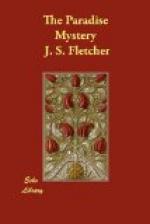“Dead!” he said in a hushed voice. “Died as we got to him. Broken—all to pieces, I should say—neck and spine certainly. I suppose Varner’s told you what he saw.”
Mitchington, a sharp-eyed, dark-complexioned man, quick of movement, nodded, and after one glance at the body, looked up at the open doorway high above them.
“That the door?” he asked, turning to Varner. “And—it was open?”
“It’s always open,” answered Varner. “Least-ways, it’s been open, like that, all this spring, to my knowledge.”
“What is there behind it?” inquired Mitchington.
“Sort of gallery, that runs all round the nave,” replied Varner. “Clerestory gallery—that’s what it is. People can go up there and walk around—lots of ’em do—tourists, you know. There’s two or three ways up to it—staircases in the turrets.”
Mitchington turned to one of the two constables who had followed him.
“Let Varner show you the way up there,” he said. “Go quietly —don’t make any fuss—the morning service is just beginning. Say nothing to anybody—just take a quiet look around, along that gallery, especially near the door there—and come back here.” He looked down at the dead man again as the mason and the constable went away. “A stranger, I should think, doctor —tourist, most likely. But—thrown down! That man Varner is positive. That looks like foul play.”
“Oh, there’s no doubt of that!” asserted Bryce. “You’ll have to go into that pretty deeply. But the inside of the Cathedral’s like a rabbit-warren, and whoever threw the man through that doorway no doubt knew how to slip away unobserved. Now, you’ll have to remove the body to the mortuary, of course—but just let me fetch Dr. Ransford first. I’d like some other medical man than myself to see him before he’s moved—I’ll have him here in five minutes.”
He turned away through the bushes and emerging upon the Close ran across the lawns in the direction of the house which he had left not twenty minutes before. He had but one idea as he ran—he wanted to see Ransford face to face with the dead man —wanted to watch him, to observe him, to see how he looked, how he behaved. Then he, Bryce, would know—something.
But he was to know something before that. He opened the door of the surgery suddenly, but with his usual quietness of touch. And on the threshold he paused. Ransford, the very picture of despair, stood just within, his face convulsed, beating one hand upon the other.
CHAPTER IV
THE ROOM AT THE MITRE
In the few seconds which elapsed before Ransford recognized Bryce’s presence, Bryce took a careful, if swift, observation of his late employer. That Ransford was visibly upset by something was plain enough to see; his face was still pale, he was muttering to himself, one clenched fist was pounding the open palm of the other hand—altogether, he looked like a man who is suddenly confronted with some fearful difficulty. And when Bryce, having looked long enough to satisfy his wishes, coughed gently, he started in such a fashion as to suggest that his nerves had become unstrung.




